FIFA 12 Review
Posted by
SpectralShock
on
It’s no doubt difficult to improve on a sports franchise that has already achieved quite a lot of success, even with yearly iterations. Thus is the challenge of FIFA 12, this year’s annual release dedicated to the worldwide sport of football (soccer). To follow up on last year’s good title, which introduced many significantly new elements such as ability to play in goal, was likely a difficult task. However, all this considered, it’s fairly safe to say that EA Sports have put together another great title in this year’s version of the franchise. Significant changes to gameplay, though not always flawless, add much to the overall experience – while notable improvements in online and offline modes also do well to compliment the overall package.
As a fan of the franchise, you can once again expect to get a ton of value out of the game. All of the official players, teams, stadiums and referees are in the game, providing a wealth of content to explore. Sure, some of the lower-tier teams and players may not yet have the accuracy of the stats that you’d get from a sim title such as FIFA Manager or Football Manager, but these are minor faults in an otherwise almost overwhelming database of information. Players can once again use the game’s editing tools to further fine tune their experience, and that offers unprecedented value.
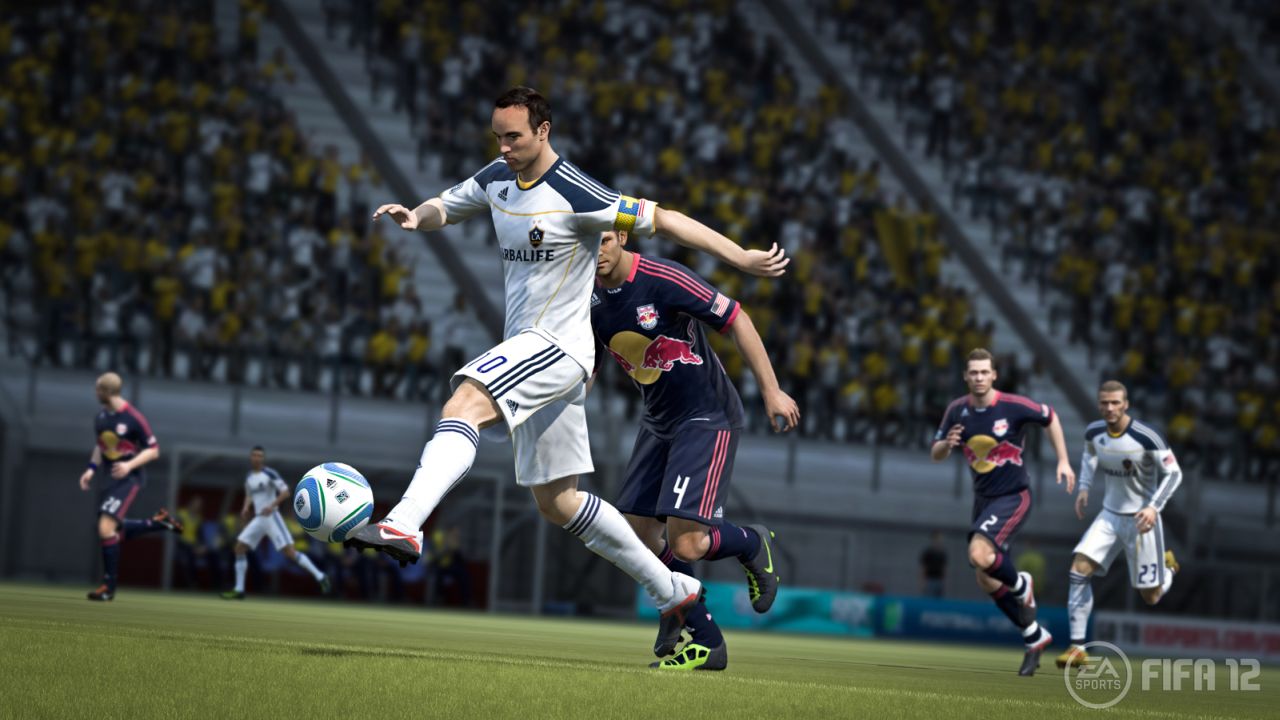
FIFA 12 comes with a variety of modes, but new this year is a feature which connects everything you do in the game – EA Sports Football Club. This XP-based ranking system lets users track and share literally everything that happens in the game. Whether it’s winning a game, signing a new player, or creating your virtual pro, everything earns experience points which are contributed towards a running total. Actually having a certain EASFC level doesn’t impact your game in any way – instead, it’s a social media-like way to share everything you do with friends. And for those interested in that sort of community communication, the tool is certainly worthwhile. For more casual fans though, it’s the global aspect of team leaderboards that’s more intriguing.
You see, all experience points that are earned can be contributed to a player’s team of choice. These points are then tallied by all players in the world, resulting in a leaderboard of clubs based on how many points have been earned by their respective fan communities. It’s a rather fun way to make use of your experience points and makes you feel like a part of a global experience. There safeguards in place, such as taking the average amount of XP earned in a set period instead of overall, to prevent the world’s top clubs from always dominating the standings. As for players who change their mind and want a new team to contribute to – that’s also allowed, though only once per month.
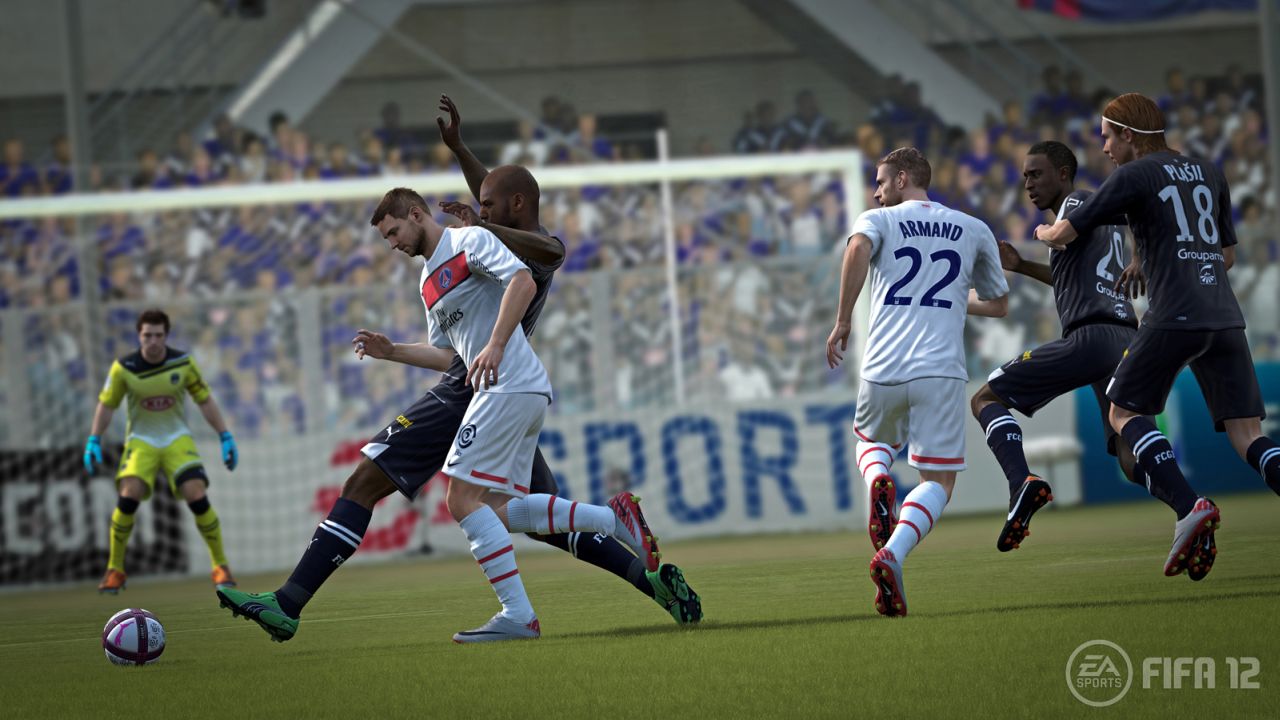
As mentioned, all of the offline modes from previous years are back. Be a Pro, after the big introduction of goalkeeper play last year, has received very few changes. Players can still take control of their created player and guide them to glory, but it’s much the same experience as last year. In Manager mode, on the other hand, a few good changes have been implemented that supplement the flow of the game. First up, the trade deadline day is now a minigame in itself, allowing the user to manually advance time during the day and hoping to complete player negotiations. It works well enough, and gives you an additional few chances to get the signing you want – but there’s nothing drastically different about the process or the AI trading logic during this period. So, most of what the trade deadline day accomplishes is it lets you complete a few last second deals if you’ve been procrastinating until now.
Trading is actually a bit of a problem in the game. Like last year, EA Sports seem to have cranked up the deals way too much, and in the first summer you’re likely to see over 10 players being dealt at $50mil+ figures. We’re talking superstars from every team imaginable, from Kaka to Drogba. Of course, it’s possible in the real world too as was the Torres deal, but there are simply too many superstars moving around in FIFA 12 – and that’s just in the first transfer window. Still, trading with the CPU is a tense but fun affair as you try to get the best deals and attempt to keep others from stealing your star strikers.
Another addition to the Manager mode is an improved scouting system. Like Manager sims, players are now able to hire a youth scout based on his abilities and send them to a specific country to scout young talent. These scouts will provide monthly reports, and players must make decisions to dismiss, sign, or continue to scout a player at the risk of them getting signed by another team. This is a neat addition that adds depth to the youth system in the game, though it’s still a rather basic feature in comparison that will hopefully improve in the future.
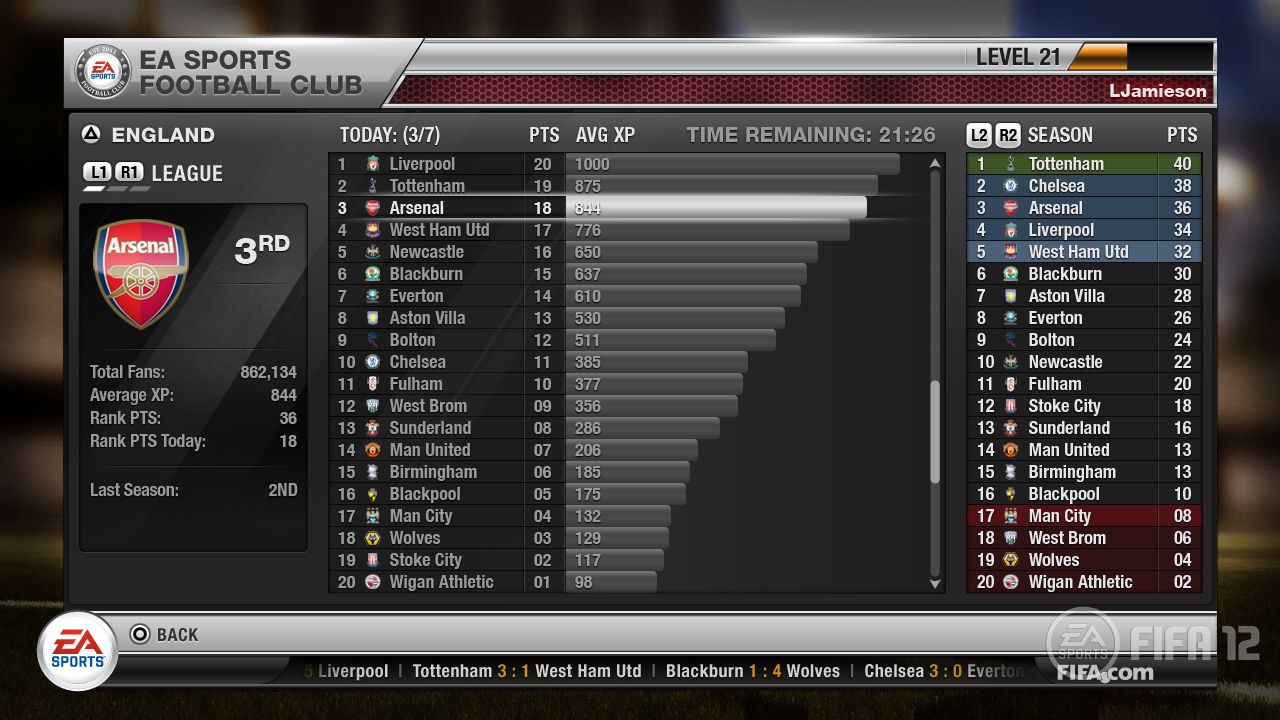
A more significant change in the Manager mode is the added emphasis of Morale and Form to all players. Key elements such as play time, salary, and position will all affect the player’s ability on the pitch and their mental state, resulting in some interesting situations. Both players and managers are now able to speak to the press about upcoming fixtures or the club, and though this is once again a feature that’s been done (and better) in FIFA Manager titles, it’s good to see it here.
Finally, and perhaps most importantly to all offline players, the developers have added a variety of gameplay slider settings to the game. Those who’ve played EA’s other franchises, such as NHL, may already be familiar with this set of settings that allow a user to customize their gameplay experience completely. Users can adjust everything from ball control to shot accuracy for both themselves and their CPU opponents, resulting in endless customization options – regardless of selected difficulty level. It’s a truly fantastic feature that’s great to see finally making an appearance in FIFA.
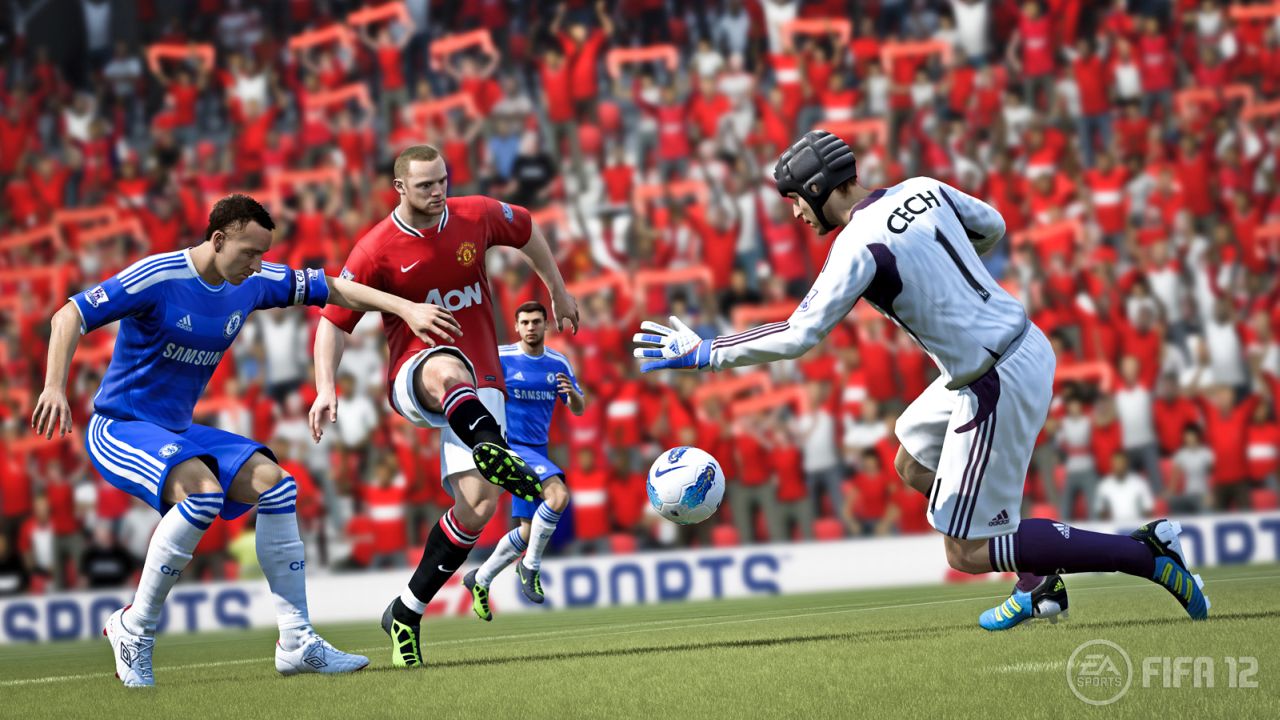
Arguably, the most notable changes and additions in FIFA 12 are where it matters most – on the pitch. A variety of changes and innovations make an appearance in this year’s title, and their resulting outcomes range from excellent to possibly frustrating. In development for apparently two years, the player impact engine introduces real time physics to the game. This means that all collisions in the game are now real time instead of animated, which results in a vastly new feel for the gameplay. Players can stumble, fall, and recover realistically and all the limbs move as independent objects, which often looks rather fantastic. Unfortunately, there are other times, when the physics engine reveals that it’s simply not refined. Players glitch and awkwardly stumble all over each other, often resulting in hilarious but non-the-less troubling player interactions. The ball physics are live as well, thus some tackles result in rather unrealistic behavior and rather unnatural bounces. It’s a step in the right direction for sure, but the impact engine could use more work to iron out some of the glitches.
It’s not all bad though. With the new physics, players can get injured in very realistic and appropriate ways. This often presents fantastic scenarios – for example, a player attempting to clear the ball with a header collides with another player, and the resulting injury to his head and neck forces a substitution. Seeing something like this happen in real time, which in turn affects your Manager mode decisions and starting lineups, is simply fantastic. It adds a whole new level of realism and seriously impresses. Quick throw-ins are also possible now, which function in much the same way as quick free kicks. If the ball is nearby, a player will run to get it and attempt to take the throw. However, the players often awkwardly drop the ball after picking it up, or can’t reach the ball even though it’s within two feet of them. Again, with a bit more polish, this could be a nice addition to the flow of the game.
The biggest change to how you play the game in FIFA 12 has to be the tactical defense system. It’s bound to either bring much joy or many cries of frustration, depending on who you ask. No longer are players able to pressure and defend by simply holding a button and using tackles when needed. Now, pressing has been eliminated altogether and all tackles – including standing ones – must be done manually. This takes quite a bit of time to get used to, and even longer to get good at. Players can now jockey and employ a second defender when needed, but these changes don’t hide what is otherwise a completely manual defence system. Though it can thankfully be switched off in single player modes, online you’ll be stuck with the new system which is bound to result in tons of high scoring games. Wins will now come from the person who can score the most; as most players will likely struggle with the new defending, if their skills of (easier) defending system in FIFA 11 was anything to go by. It’s up to EA Sports though, and perhaps with enough player pressure, the legacy defending system might be allowed to be used online.
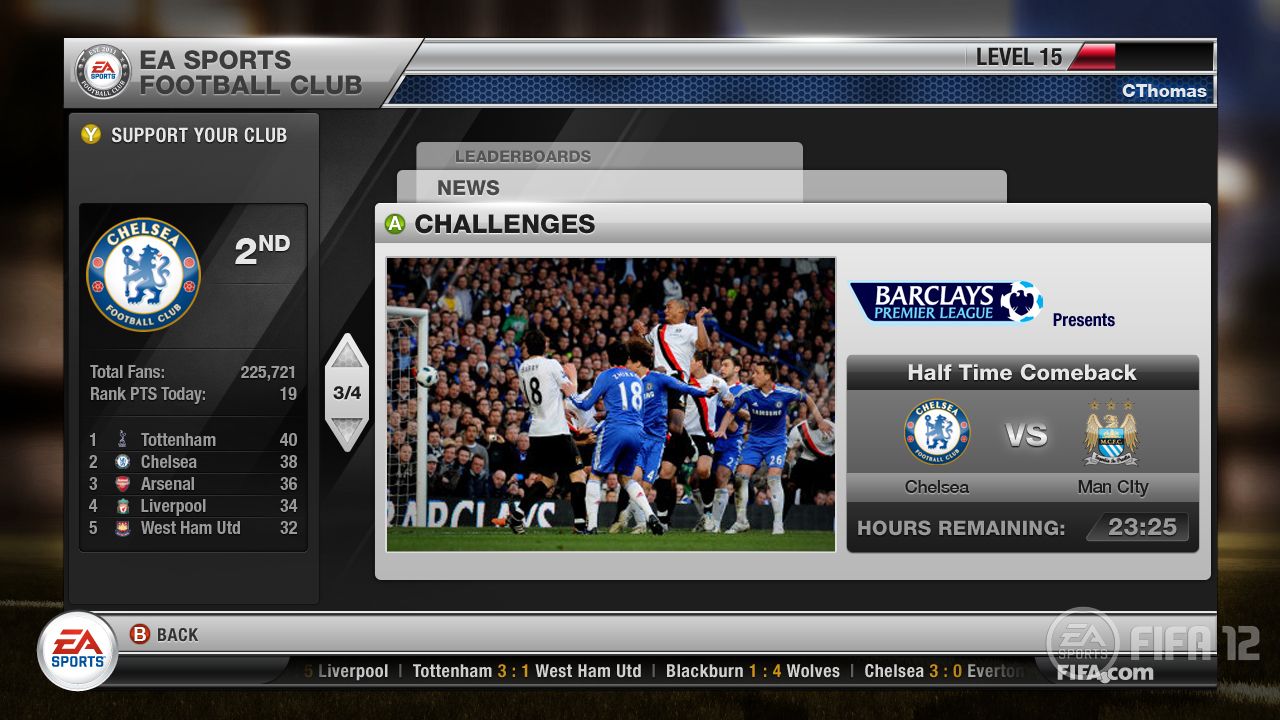
Speaking of online play, a few changes have occurred in these modes as well. The Virtual Pro and Clubs function much in the same way as before, in fact almost nothing has changed since last year – though that’s not a big deal, as it’s already a solid offering. Instead, the developers revamped online versus play into seasons. Rather than playing random strangers and just buffing your record, there are now 10 tiers of online leagues. Everyone starts off at the lowest level, and must earn a certain amount of points in order to be promoted. Playing against opponents who selected a similar team rating and are on the same online league level, earning points works the same as in any season mode (3 points for a win, etc). Seasons last 10 games, so playing those games will mark the conclusion of the season. If you do poorly, you can be relegated as well. At the end of each month there are also dynamic cup playoff tournaments, where winning makes you progress while losing means you’re to start at the round of 16 again. A friendly seasons mode also exists, which functions much in the same way but your opponents are limited to your friends list. Overall, the new online head to head seasons are a fresh, if not overly original, approach to competitive play that should only add to your desire for more online gaming.
As an added bonus, the previously DLC-only mode FIFA Ultimate Team comes on the disk with FIFA 12. For those unfamiliar, UT is a mode where players can put together a team based on drawing random packs of player cards. By putting together a team and then participating in offline or online tournaments, coins are earned which can be used to buy more players via user auctions and card packs. Or, if you’re looking for a quicker way to victory, it’s possible to buy card packs with real money. Players can lose moral, get injured, and run out of contract and there are consumable cards that address all these needs. There is also a chemistry and positional system in place that allow a weak but fully in-sync team to take on an overpowering but unsettled opponent. It’s a fun mode all on its own and good to see it being offered together with the game this year.
Presentation in FIFA 12 has also taken a step up. The game has all-new commentary with three new members in the box, who all sound very enthusiastic. It’s simply refreshing to hear new voices in a sports franchise these days. But that’s not all – the commentary itself is excellent at following the action on the pitch as well as actually reflecting on events outside the game. The commentators will often speak of new signings, team expectations, and comment on actions you’ve such as resting a player that was ready to return from injury, or any press comments made by you before the match day. It’s truly impressive stuff at times, and it’s likely because of new commentator staff that EA Sports finally decided to take it to the next level. Visuals have been touched up as well, with player closeups during cutscenes looking particularly impressive at times – though this makes the very low-polygon crowd stand out in a negative way. During substitutions, the players even act appropriately and appear disappointed if the team is losing, but excited as they are subbed on to a winning side. The soundtrack is as great as ever, playing hits from across the globe that are very catchy, even if you can’t understand a word.
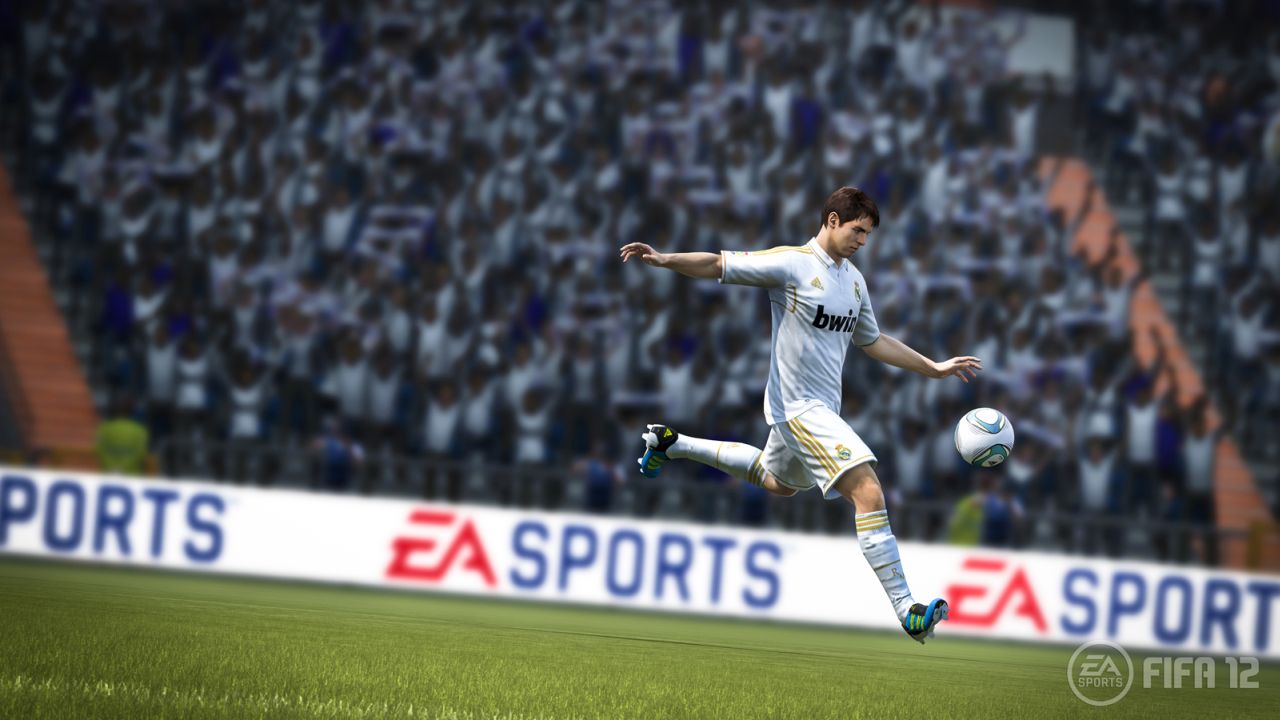
On the technical side of things, the game runs well for the most part. Most of the issues are actually tied to the EASFC, as the game will frequently lose connectivity to the service, thus all your progress is not tracked. The only way to reconnect is to restart the game, because there is a lack of an option to retry the connection within the menu. Mentioned previously, the new physics system can be quite awkward to look at and play with, with players often behaving uncontrollably during certain collisions. The quick throw in was a good idea but also lacks polish. Some of the cutscene animations look a bit weird, with players trying to go for the ball while the camera is closely zoomed in on them. And even during goal celebrations, the camera seems awkwardly positioned and zoomed way too closely.
With FIFA 11, EA Sports had yet another hit on their hands. Though the franchise is already a top seller and has done a lot of things that fans have asked for, the series continues to move forward. FIFA 12 introduces key foundations, such as the physics engine, that will be sure to bring about some great gameplay in the future but currently lack some fine tuning. The realistic injuries that are a part of the engine are here now though, and work very well. Tactical defending will be a love/hate factor with fans, but at least offline it can be switched off. Some welcome changes have been made to Manager mode, and Ultimate Team being included with the game this year is a nice bonus. Those who play mostly online should try a demo to check out the new defense controls, to ensure that they’d be able to compete in the online head to head seasons. With fantastic presentation and only a few minor technical gripes, FIFA 12 is a great football title. If the new tactical defending and the occasional physics glitches aren’t a big factor for you, FIFA 12 comes easily recommended to any footy fan out there.
